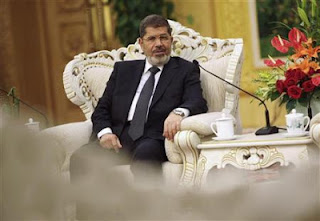Egypt, IMF resume talks over $4.8 bln loan
The Egyptian government resumed negotiations on Wednesday with the International Monetary Fund on a loan to help the country shore up public finances that have haemorrhaged since its popular uprising.
Many foreign investors are waiting for an IMF agreement before venturing back to Egypt. Cairo has asked for a $4.8 billion loan, but officials have said it might seek more.
An IMF team, which held an initial round of talks with the new government of President Mohamed Mursi in late August, returned to Cairo on Tuesday. Various Egyptian governments have been negotiating for an IMF loan for the last year and a half.
"The talks started with the Egyptian authorities," IMF spokeswoman Wafa Amr told Reuters, without giving details.
Presidential spokesman Yasser Ali said Egypt had presented its programme of economic reforms to the IMF, also giving no details. His comments were carried on a website of the Muslim Brotherhood, the group that propelled Mursi to power.
The government says the reforms, which it has yet to publish, will be open to public debate.
Egypt formally asked the IMF for a loan in August to help it plug budget and balance of payments deficits that have mushroomed since long-time leader Hosni Mubarak was ousted in February 2011.
The IMF has in return asked Egypt to present it with a programme and line up additional financing from other agencies and countries. It has asked the government to demonstrate that any programme has broad political support within Egypt.
The IMF wants Egypt to take long-term steps to narrow a budget deficit that has grown to 11 percent of gross domestic product since the uprising, and measures to reduce costly state fuel subsidies will be key to any deal.
Energy subsidies now eat up around a quarter of total government spending. A minister said this month that the scale of subsidy cuts planned for fiscal 2012/13 would not be realised because of delays in implementing restructuring.
Officials have said the government also wants to expand sales tax into a full-blown value-added tax (VAT), a move that was part of a programme discussed by the government under Mubarak.
By Patrick Werr
CAIRO (Reuters)




Comments
Post a Comment